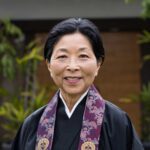Becoming a Buddhist priest was as much a surprise to me as it was for everyone who knew me. I grew up as a Shin Buddhist, taught elementary school, became a criminal defense lawyer, married a Catholic, and raised three sons attending a neighborhood Catholic church. My path back to the buddhadharma was in response to a family crisis and a search to find deeper meaning in my life.
Being a parent of adult children, now ages thirty-six to forty, is a delicate balancing act, requiring respect, sensitivity, and love. I’ve been treading that path for a while now, sometimes with great difficulty. Gratefully, the Buddhist teachings have given me a way to support my children with compassion, acceptance, and a deeper understanding of their needs.
What follows are the seven things I’ve learned about supporting and loving adult children.
Unconditional Love
Continuing to love, care for, and nurture my sons is crucial to maintaining the healthy relationship I have with them. This foundation assures them that my love for them is unconditional, no matter what. This was crucial when dealing with substance abuse issues. In spite of challenges that included anger, frustration, and hurt emotions, they’ve never doubted that they’re cherished.
That said, I’ve had to be careful not to fall into unhealthy codependency and enabling. This has required setting boundaries and limits, which is sometimes called “Tough Love.”
Respect and Nonjudgment
Two important keys for me are respecting my sons’ decisions and being as nonjudgmental as possible. I trust them to be responsible and accountable for their own lives. Sometimes their decisions don’t work out, and the urge to rescue is undeniable. Standing by as they fail is sometimes my greatest contribution to their growth and maturity. From these failures come invaluable life lessons in understanding the Buddhist truths of impermanence and interdependence.
None of my sons pursued careers my husband and I had hoped for them as children. Instead, each one has found a path that suits his unique interests and temperament. I’m moderately secure in the fact that I did not push them too hard in any one direction.
Nonattachment and Being Present
It’s difficult to watch when my sons struggle to move forward in their lives or to cope with disappointment. But Buddhism has been very helpful in teaching me the value of nonattachment, which is completely different from detachment. Nonattachment is about focusing on the situation at hand and not being attached to a specific outcome. Detachment has connotations of not caring and nihilism.
An enormously valuable parenting skill has been helping my sons learn to deal with what is in front of them, right now, without judgment or expectation of a desired outcome. They’ve each received the valuable life lessons of putting forth their best effort, being fully present, and not focusing on the result.
One of my sons was a recruited college athlete; however, his four years as a collegiate teammate were fraught with frustration. To his credit, he never quit, continued to work hard, and earned the respect of his teammates.
Be an Honest Listener
When my sons are struggling, I make every effort to engage them in an honest and straightforward discussion, help them consider options, and offer opinions if they want them. Often, the most helpful strategy is just being open to having a conversation and listening.
“Family dinner” is a tradition we practice once a week, with our two sons who live nearby. Our weekly dinner is a time to catch up and find out what’s going on in their lives. It’s a wonderful way for us to stay connected and close, and they know my husband and I will always listen to them. Thank goodness for texting, Zoom, and FaceTime for keeping in touch with my third son who lives across the country.
Let Go of Control
As a parent, it’s easy to get used to being in charge, making decisions, and controlling outcomes. For my adult children, as a wise parent, I step back and try not to argue, coerce, or manipulate. My goal is to maintain a long-term, loving, and harmonious relationship with my children, allowing them to be themselves.
As a parent, I will, of course, have my own opinion and will freely offer my sons the “benefit” of my wisdom, but ultimately, I’m here to support and encourage them in what they want to do. When my children moved into adulthood, that was the time to let go and let them live their lives. I sometimes have a harder time doing this than they do, but it’s truly good for all of us. They’re adults; recognizing this is part of coming to terms with reality as it is.
Let Go of Guilt
Another issue I’ve learned to put behind me is guilt, feeling responsible for a bad situation. Sometimes despite my best intentions, or sometimes because of them, things go awry. Buddhism teaches that things arise and fall away as the result of myriad causes and conditions, too innumerable to count. Consequently, not one thing is the cause of anything. This doesn’t absolve me or anyone else from some responsibility for a situation, but it’s wise to keep in mind that many factors contributed, because that’s the actual reality.
Find Meaning in All of Life
Moving forward, learning from my mistakes, and allowing my adult children to make their own mistakes, I use life’s challenges as important tools for self-reflection and self-awareness. Awakening comes from answering the question, “Who am I?” As a parent I try to guide my children to answer that question for themselves. In my life, both my sons and the Buddhist teachings are incredible gifts.

